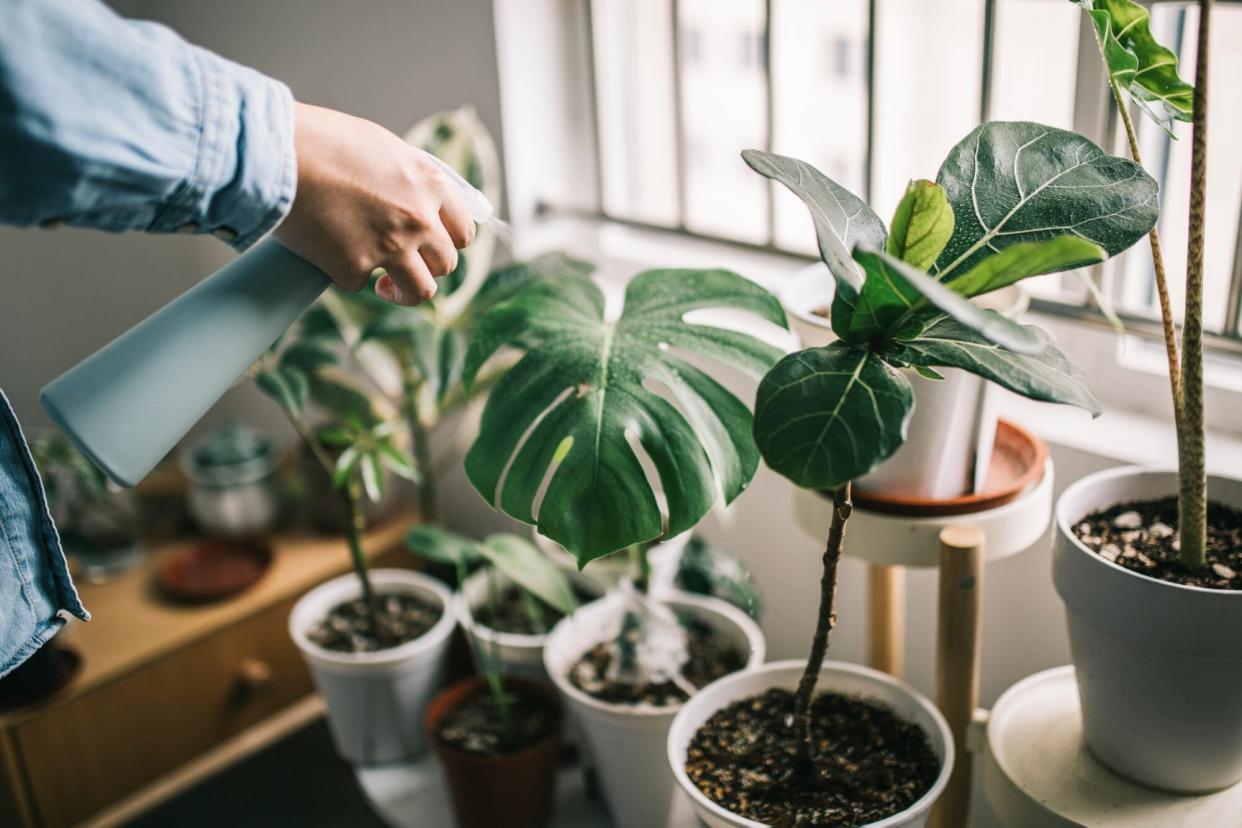Houseplants Won't Really Purify the Air in Your Home—but There Are Plenty of Other Benefits to Owning Them

GETTY IMAGES
TABLE OF CONTENTS
On This Page
Air Purification, Debunked
Improve Indoor Spaces
Help Reduce Anxiety
Improve Focus
Provide a Sense of Purpose
How to Reap the Benefits
There are plenty of benefits affiliated with owning houseplants—they reduce stress, add color to your space, and can even improve productivity. Perhaps one of the biggest claims people make about the advantages of owning houseplants, however, is that they purify the air in your home. The only problem with this theory? Up-to-date studies have proven that it isn't exactly true.
But this doesn't mean that you should abandon the idea of keeping houseplants altogether, since the greenery still makes your home a more enjoyable space than it would be with no plants at all. Not only do they add verdant color and personality to your abode, but they actually improve your overall quality of life.
Related: 24 Beautiful Houseplants That Are Perfect for Apartment Living
Why Houseplants Don't Purify the Air
The idea that houseplants purify the air came from a 1989 study conducted by NASA and the National Association of Landscape Professionals. The research states that low-light plants demonstrate a surprising potential for improving indoor air quality because they help remove the build-up of pollutants like benzene, formaldehyde, and trichloroethylene. NASA's research has since served as the foundation for many follow-up studies about the air purifying benefits of houseplants.
However, a 2019 study published in the Journal of Exposure Science and Environmental Epidemiology states that the previous research isn't reliable because the scientists tested the toxin-removing capabilities of houseplants in labs. When testing this in a household environment, researchers found that it would take around 10 plants per square foot (essentially, an indoor forest) to make any notable difference when it comes to purifying the air in a home.
Houseplants Enhance Indoor Spaces
Houseplants absolutely do, however, benefit your home. While you may opt for a blanket or area rug to make rooms more comfortable, a 2019 study published by the Multidisciplinary Digital Publishing Institute found that plants can also make indoor spaces cozier. The results of 50 reviewed studies noted that rooms with plants were perceived to be more comfortable than rooms without them, which led to a greater self-reported quality of life among participants.
"Houseplants add a bit of nature to any space. Their texture, color, and form add to the look, feel and ambience of the room," says gardening expert Melinda Myers. "Plants, like artwork and other decorations, can reflect our personality."
Houseplants Reduce Anxiety
The researchers also found that houseplants reduced negative emotions among participants, including feelings of anxiety, pressure, and fatigue. "Taking a mindful approach to houseplant care can help reduce stress and promote emotional well-being," says Andrew Bertagnolli, Ph.D., a clinical psychologist at One Medical. "This means [being] fully present when tending to the plant, noticing the new growth and flowering buds, and taking time to appreciate the hard work you've done."
Even if you've encountered an issue with your plant—perhaps the leaves are yellowing or you have a pest problem—you can still reap the emotional benefits of owning a houseplant. "Putting a detective's cap on and trying to discover what may be contributing to the plant's struggle, rather than engaging in self-blame and criticism, can help one maintain a positive outlook," says Bertagnolli.
Houseplants Improve Focus
Have you been searching for a natural way to improve your focus? According to the results of the study, houseplants can do that, too. Participants reported greater concentration, productivity, and academic performance in indoor spaces with plants. "When we are tending to the needs of our houseplants, we are focused on the here and now," says Monica Vermani, C.Psych., a clinical psychologist. "We get out of our heads and reconnect with our senses."
Houseplants Provide a Sense of Purpose
Providing care for something or someone beyond ourselves—whether it's a houseplant, pet, or loved one—is a proven way to benefit our mental health. "When we are able to go beyond ourselves, when we are motivated to take care of something that relies on us for its well-being, we garner a sense of purpose, an interest in striving to be a better person," Vermani says.
Additionally, owning houseplants results in an influx of new knowledge—you have to know when to water them, what type of soil they need, and how to repot them. Mastering these methods can also enhance one's sense of purpose. "Caring for houseplants often involves having specialized knowledge and experience, which again can be a source of pride and purpose and can be shared by others," says Bertagnolli.
How to Reap the Benefits of Houseplants
Though you'd need hundreds of houseplants to purify the air in your home, it actually takes very little greenery to boost your emotional well-being. According to the study, even just one small flower pot was conducive to better mental health.
The study also found that it doesn't take long to reap the wellness-promoting effects of houseplants: The time of exposure to greenery required for positive perceptions was less than 20 minutes. "Therefore, using indoor plants to increase the occupants' positive psychological perceptions is a highly achievable, feasible, and effective means, which does not cost much energy and money," the research states.
